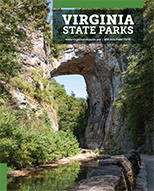Read Our Blogs
Revolution and Resolution: Chippokes in the 18th Century
A still, hot haze hung over the cornfields of Chippokes on a July morning in 1781. The birds were silent, and the only sound detectable was a dim clattering in the distance. A loud crack suddenly rang out from the direction of the river, and with yells and gunfire, the Skirmish of Chippokes had begun.
March on over to Chippokes State Park this Independence Day weekend
For the most part, the American Revolutionary War had left Chippokes in peace. When the war began in 1775, the plantation belonged to a glamorous London heiress named Lucy Ludwell Paradise. Having already been cultivated for 160 years, Chippokes boasted established fruit orchards, a bustling river wharf, and its own toll road. It brought a great deal of money to 23-year-old Lucy and her husband, John, despite the fact that they lived in England and John had never even been to Virginia.
The Paradises spent Chippokes’ profits as fast as they came in, hosting lavish parties, entertaining dignitaries, and feeding John’s growing alcohol problem. Life for the Paradises during the American Revolution was vastly different from that of their Virginia family and friends.
Ranger Hannah Sullivan interprets life in Revolutionary War-era Virginia at Chippokes
Virginia, along with its sister colonies, was its own world, far removed from English society. Wealthy planters could afford English luxuries like fine furniture, clothes, and silver, but most free Virginians lived simply. A one- to three-room wood house was the norm for middle income colonists, such as craftspeople, shopkeepers, and farmers. Unlike their English relatives, Virginians ate an enormous amount of pork, along with lots of cornmeal.
If you ate dinner with an average Virginia family during the Revolutionary War, you would likely dine on some combination of pork, cornbread, molasses, turnips, sweet potatoes, and butter. Many families kept small vegetable gardens too, growing things like lettuce, carrots, tomatoes, and asparagus to offset salt-heavy wartime foods.
Cooking during the Revolutionary War looked very different from today
Chippokes often found itself near centers of Revolutionary events, but until the final days of the war, it remained largely untouched. Just upriver in Richmond, Patrick Henry gave his famous Give Me Liberty speech in 1775. Later that year, the British crept into Williamsburg (directly across the river from Chippokes) and stole most of the city’s gunpowder. In December, the American victory at Great Bridge, forty miles east, signaled the end of British occupation in Virginia. In 1776, news came from Williamsburg that Virginia had declared itself free from British rule.
Independence meant that life would never be the same in Virginia. For the poor and enslaved, the changes were small and relatively insignificant, but for wealthy plantation owners who lived in England (like the Paradises), change hit hard. Virginians declared that British citizens and sympathizers could no longer own land in their state. Lucy and John Paradise lost their beautiful Virginia lands, including Chippokes, to the newly-formed commonwealth. Chippokes’ fruit-filled orchards, expansive tobacco fields, and bountiful corn crop now yielded income for the government of Virginia, fueling the fight for independence.
Chippokes' first stint as Virginia state property came during the Revolutionary War
The war burned on for five more years, claiming thousands of lives across the former colonies. As the British began to grow desperate in 1781, they hatched a plan to move east and south to Portsmouth. The only way they could cross the James River however, was to use the Jamestown Ferry. Knowing that the crossing would make them vulnerable, British General Cornwallis sent a decoy army ahead.
His plan was that the Americans would attack these decoys, who would lead them away from the ferry. This would allow the rest of his army to cross.
Reenactments of the Battle of Green Spring, the Skirmish of Chippokes, and the Battle of Spencer's Ordinary will take place July 6 and 7, 2019
On the still, hot morning of July 6, 1781, British soldiers landed in Surry County. It wasn’t long before the American soldiers, led by General Lafayette, descended on them, and the skirmish headed toward nearby Chippokes. Cornwallis thought his plan was going perfectly, but soon realized the Americans were stronger in numbers than he had believed. He decided not to cross the James River, but Lafayette’s men did, engaging with the British at a Jamestown plantation owned by Lucy Paradise’s sister, an American patriot named Hannah Ludwell Lee. The plantation, Green Spring, lent its name to the battle. Although technically a British victory, the Battle of Green Spring was a prelude to the ultimate American victory: the Battle of Yorktown.
Chippokes, the peaceful riverfront farm, had survived its brush with the Revolutionary War.
Although life for Virginians today bears little resemblance to the 18th century, on the weekend of July 6 and 7, 2019, time will turn back at Chippokes State Park.
Just as it took place exactly 278 years ago, the Skirmish at Chippokes will be reenacted, along with the Battle of Green Spring and an earlier battle at Spencer’s Ordinary. At Prelude to Yorktown, costumed interpreters and reenactors will share not just the military side of life in the 1700s, but the domestic side as well. Food, fashion, fun, and other aspects of Revolutionary Virginia will be on full display at the historic park.
We hope you’ll join us as we explore history firsthand and celebrate American Independence!
If you have read the article and have a question, please email nancy.heltman@dcr.virginia.gov.
Search for blogs
By Park
Categories
Cabins
Camping
Fishing
History and Culture
Other
Programs and Events
Trails
Volunteers
Water Fun
Archive
2025
2024
2023
2022
2021
2020
2019
2018
2017
2016
2015
2014
2012


















